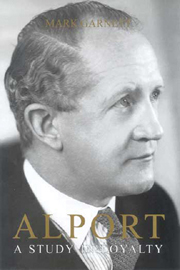Book contents
- Frontmatter
- Contents
- Acknowledgements
- Foreword
- Introduction
- 1 Father and Son
- 2 A National Faith
- 3 “Love and War”
- 4 Reviving Conservatism
- 5 “One Nation”
- 6 Early Postings
- 7 “Political Suicide”
- 8 “More Trouble with the Government, Daddy?”
- 9 A Freelance Diplomat
- 10 Gains and Losses
- Notes
- Bibliography
- Index
- Plate section
6 - Early Postings
- Frontmatter
- Contents
- Acknowledgements
- Foreword
- Introduction
- 1 Father and Son
- 2 A National Faith
- 3 “Love and War”
- 4 Reviving Conservatism
- 5 “One Nation”
- 6 Early Postings
- 7 “Political Suicide”
- 8 “More Trouble with the Government, Daddy?”
- 9 A Freelance Diplomat
- 10 Gains and Losses
- Notes
- Bibliography
- Index
- Plate section
Summary
Having decided not to be a “bloody fool” and to accept the Chief Whip's advice, Cub threw himself into the job of Assistant Postmaster-General as if it was the one he would have chosen for himself. He was given responsibility for telephones and the Royal Mail, and within hours of the appointment he was escorting the Mayor and Sheriffs of London around the Mount Pleasant sorting office. Cub's first inspection of his new empire came at its busiest time, because the Christmas mail was being processed. His initial misgivings were almost forgotten as he realised that he had been made “the de facto chairman of a major public service”; after his wartime experiences and his time at the CPC he knew a well organised machine when he saw one. “From that moment onwards”, he wrote years later, “I was a devoted admirer of the British postal service”.
Cecil and Janet were spending the winter months in South Africa, as had become their habit. Cub told them his news in a telegram, and on Christmas Eve scribbled a letter which was a curious mixture of excitement and defensiveness. “Although it is a junior job”, he told them, “the competition is fierce. The PM made only eight appointments from the back-benches .… Whatever happens in the future I shall at any rate have got myself out of the ruck”. He went on to describe the “trappings of majesty” associated with the post: “I have a colossal office adorned by oils from the national collection. A private secretary and assistant, a car and a chauffeur and heaven knows what else”.
- Type
- Chapter
- Information
- AlportA Study in Loyalty, pp. 121 - 142Publisher: Acumen PublishingPrint publication year: 1999



